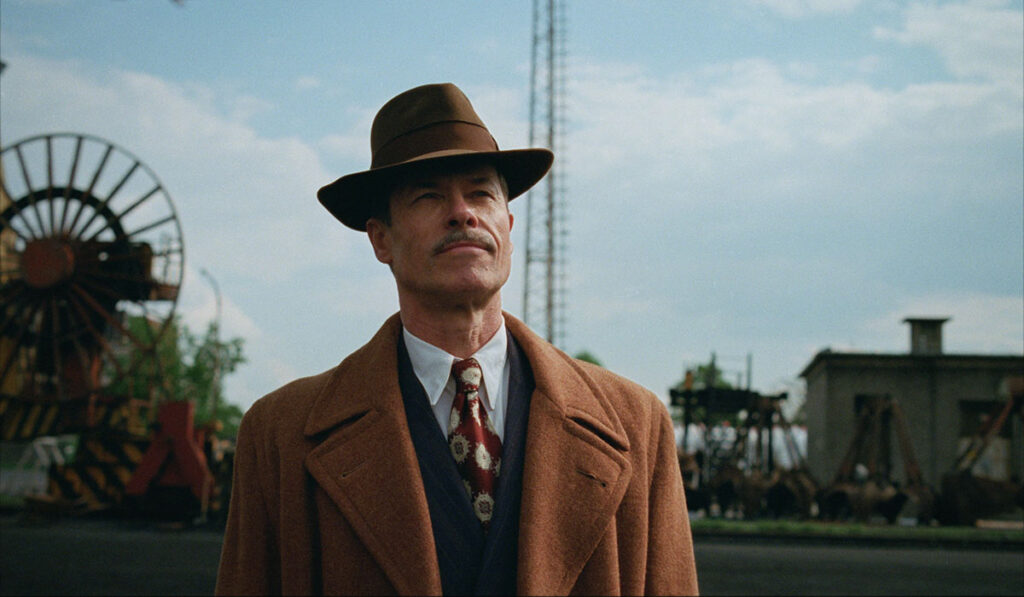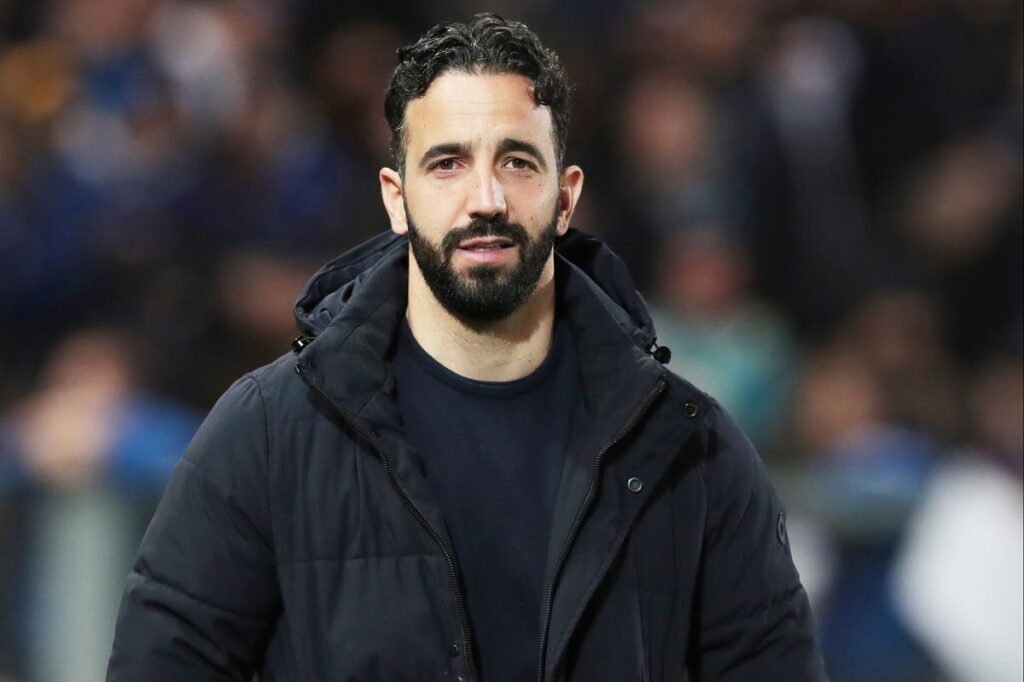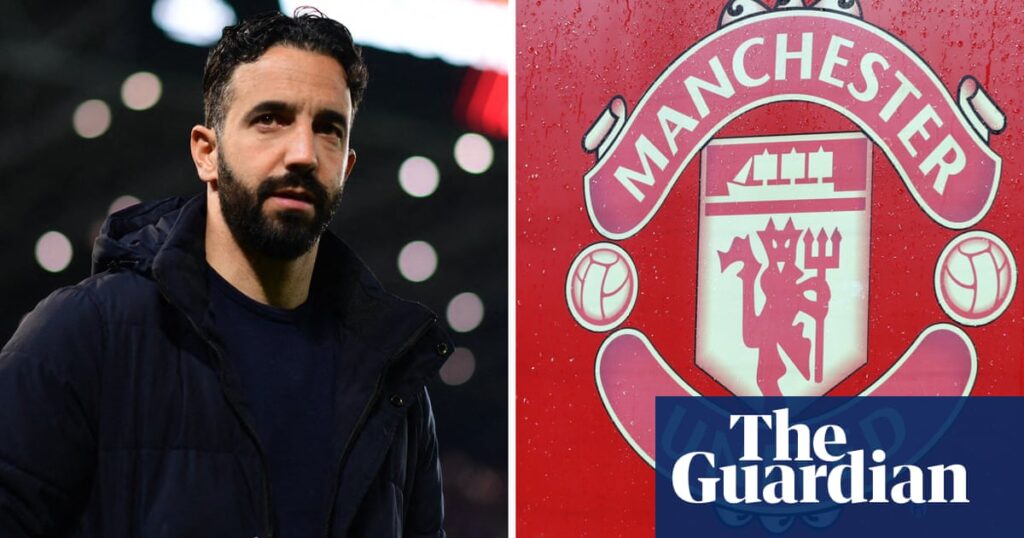It may finally be time for Guy Pearce to get that Oscar nomination. The versatile actor has a legitimately legendary resume at this point. Roles in modern classics such as “The Adventures of Priscilla, Queen of the Desert,” “L.A. Confidential,” “Memento,” “The Hurt Locker,” “The King’s Speech,” “Animal Kingdom,” “Prometheus,” and acclaimed mini-series “Mildred Pierce” and “Mare of Easttown.” Oh, and all while making sure to star in independent productions in his native Australia as much as possible. He knows this business, and he knows talent. Hence, his eagerness to star in Brady Corbet’s “The Brutalist.”
READ MORE: Felicity Jones: “I felt I had a mountain to climb” [Interview]
In the celebrated epic, Pearce portrays Harrison Lee Van Buren, a wealthy Mid-Century American industrialist who has grand aspirations for a plot of land in the Pennsylvania countryside. He thinks he’s found an architect with a similar vision in László Tóth (Adrien Brody), a recent immigrant to the United States who has fallen on hard times. As he embraces Tóth, he also attempts to endear himself to Tóth’s wife, Erzsébet (Felicity Jones), who eventually sees Van Buren for who he really is.
Pearce says he’ll star in anything Brody asks him to in the future, but even when “The Brutalist” came his way, he knew it was an easy yes. He recalls, “I looked at his two other films, ‘Vox Lux’ and ‘The Childhood of a Leader,‘ and I just went, ‘I have to work with this guy. I got this script. He’s asking me to do this. I’ve spoken to him on the phone. I’ve looked at these films. This is a no-brainer.’ I remember when my agent called me in 2010 and said, Todd Haynes and Kate Winslet and HBO are wondering whether you’d like to come and do this, ‘Mildred Pierce.’ I’m like, ‘Yeah, yep. Just say yes.’ He was like, well, ‘I’ll send you the scripts and…, I’m like, ‘Just say yes.’”
Throughout a lovely conversation earlier this month, Pearce was in something of a nostalgic mood, recalling moments from “L.A. Confidential” and “Memento.” He explains how Corbet is both an actor’s director and an auteur (rare) and tackles that one moment in the movie that has everyone talking. Oh, and much, much more.
This interview has been edited for length and clarity.
____
The Playlist: Congratulations on the film.
Guy Pearce: Thank you, Greg. I appreciate that. It’s a pretty amazing film, I have to say, if I don’t mind saying so myself.
It is a fantastic film. So happy with the accolades it’s received so far, but let’s go back to the beginning. The script comes your way. What was your initial reaction when you read it?
Well, I was just immediately taken by it. I mean, there was no question. It was completely engaging, and what was great about it was that the characters were really fully formed. So, in the same way, when you read a great novel, it just felt complete, and it felt inspiring, and it was easy to imagine this world. I didn’t have to do any building of the character. That was all done for me. I genuinely and generally feel that if, as an actor, you have to build your character, then some of the work’s not been done. I think scripts should come fully formed, to be honest. And I know that I do my best work when I’m getting on board something that exists versus going, “O.K., I can sort of see what you’re talking about, but I can’t really see this guy. I better go and create something myself.” I don’t trust my choices. So, I feel far more confident if I’m inspired by someone else’s description of a character and someone else’s realization of a character than just get on board, ride the wave, and execute. And I always do my best work that way.
READ MORE: Adrien Brody: “I have a need to be constantly cooking” [Interview]
Did Brady give you any references for your character? Was he based on any specific industrialist of the era?
Brady might’ve mentioned various people in our early discussions, but I can’t really remember. He might’ve sort of said, “This is part Rockefeller and this part so and so.” I can’t really remember, to be honest. But it didn’t matter because of the way in which he was clearly defined on the page from scene to scene to scene, and it wasn’t even the description of him. It was just his behavior through the course of the story that really enabled me to see who he was. And I could have started shooting the next day almost in a way. I mean the same with “Memento.” It was so clear to me who that guy was. And again, I just think that’s how it should be. I love great writing because I’m then propelled into my just absolute clear imagination.
You have worked with so many great directors throughout your career, and I know you have worked with some directors who were former actors, but it is very rare to find a director who was a professional actor and then has the vision of an auteur. When you were on set, did it feel like you were working with a director who was formerly an actor?
It does, but he’s also a very special former actor. There are many different types of actors and different kinds of people, and I think even as an actor, he was unusual. There was something about him that was kind of seeing the world differently than every other actor. His sense of ego and his sense of observation and insecurities, etc, etc. just feel different to other actors. So, it makes sense to me that, to some degree, that he is this auteur director based on what kind of actor he was. But in answer to your question, I certainly do think that because he was an actor before, even though I’m sure some previous actors don’t turn out to be great directors and don’t necessarily turn out to be good actors directors just because they were actors before. But I do think there’s something about Brady’s experience as an actor that just meant that there was an extremely relaxed, kind of supportive, loving, calm, trusting quality in us. That enabled us almost to the point where Brady would go, “You know what you’re doing, what you’re doing.” It was this very, very supportive and bolstering kind of quality that he brought to the set and relaxed. And he’s young, and he’s just cool, and here he is making this very sort of grand, epic kind of story.
When I read it, I think back to who I imagined Brady to be when I first read this, aside from who I imagined Van Buren to be, I was picturing Brady as someone who was going to be really intimidating. I was like, “Ooh, okay. This is a big epic. I’m going to meet this towering sort of intellect who’s scary and a school principal who I’m going to bring all of my own insecurities.” And then I started talking with Brady, and I was like, “Oh, you’re just the young cool dude.” Not to say he’s not intelligent; he’s extremely intelligent, but he doesn’t wear that. It’s something that gets in the way that, so that in itself, was an inspiring quality that enabled all of us as actors.
We had a lovely time making this film, and I can’t speak on behalf of Felicity or Adrien because their task was far more grueling than mine. But Brady is just a really warm, engaging, supportive friend. And I said to him recently, “Mate, anything you want me to do as an actor, any role you want me, just call me up, and I’ll come and do it. No question about it. Even if I’m just riding by the postman, I know it’s going to be an interesting postman because the way you are going to shoot it is going to be really interesting.” And I looked at his two other films, “Vox Lux” and “The Childhood of a Leader,” and I just went, “I have to work with this guy. I got this script. He’s asking me to do this. I’ve spoken to him on the phone. I’ve looked at these films. This is a no-brainer.” I remember when my agent called me in 2010 and said, Todd Haynes and Kate Winslet and HBO are wondering whether you’d like to come and do this, “Mildred Pierce.” I’m like, “Yeah, yep. Just say yes.” He like, well, “I’ll send you the scripts and..,” I’m like, “Just say yes.”
When I spoke with Felicity, she did say that there was little time for rehearsal and or multiple takes. She admitted it was terrifying at times. Was that your reaction or are you more exhilarated by that pressure?
Well, just to sort of be clear, I think the film appears to be much bigger and grander than what our shooting experience was or even what it felt like when we were making it. So, it was not rushed at all as far as I was concerned. This was an eight-week shoot. Some films are five weeks and four weeks, and Brady, as I said, was so relaxed on set and the reason why there weren’t many takes and weren’t many shots is because Brady didn’t need them. Not because we didn’t have the time for them or they didn’t have the budget for them, but because he knew that he could do this whole thing in one move and beautifully come around, and he would land where he needed to land at whatever time. So it was so beautifully choreographed. It didn’t feel rushed, didn’t feel like we didn’t have the budget for what we were trying to do. It was a bit terrifying. It always is, in a way, because if you’re playing characters that are relying on the specifics and the dynamics of their interactions, and if it is a film about people that looks at the psychology of people. I mean, I always want to do good work. It doesn’t matter what I do. I always want to be the best I can possibly be, but it does feel like there’s extra pressure when it’s a really great script because you don’t want to be the weak link that messes it up. And so I said to her, Felicity, recently, I said, “I was a bit nervous during that first dinner scene.” She said, “I was too. I was so nervous.”
And Brady, he’s quite happy for us to sort of run the lines and rehearse the scene, but there wasn’t a lot of rehearsal because [there was a lot of] preparation. Felicity particularly, she’d been asked to do this about two years before we did it. So she had years to think about it. I had about six months, I think. I can’t remember how long it was that I got the script before I then made the film, but there were sort of intermittent conversations with Brady all along the way. So, it’s not a rehearsal, but at least it’s not like he came in cold going, “I dunno what I’m doing.” There was a lovely sense of preparation and a great sense of support when you were there on set. It didn’t feel like we were under the pump financially. It might’ve felt like that to Brady, and I can’t speak to that. He might’ve been just like Van Buren, might’ve calmly just been sort of going, “We’re fine.” And meanwhile, he, he’s got producers going like this to him. It’s funny. I remember when we did “LA Confidential,” and it was meant to be like a 64-day shoot, and it ended up being 88 days, and the call sheet would start to say, day 71 of 64, day, day 75 of 64. I remember somebody saying, “Can you stop putting that on the call? It doesn’t look good.” And it got up to day 88, and Arnold Milchan is trying to hurry Curtis [Hanson], and Curtis saying to him, “You can hurry me as much as you like. I’m not going to go any faster.” And he just had this beautiful, calm sort of quality.
I don’t want to give spoilers away in the context of this piece but there is a somewhat shocking, startling scene between you and Adrian that happens in an Italian marble quarry. Actually, I am unsure if it was in Italy or not.
We did shoot in Italy. Yeah.
Can you talk about the preparation for that scene? Did you ever question whether it was necessary for the film?
I questioned it, and it was the thing that I probably kept coming back to the most in those months leading up to when I was going through the script. I’d be thinking about it, and I’d get to that moment. And you’re right to not sort of spoil it. But it is absolutely valid to bring it up because it is a shocking moment, and it is an extension of the power play, really. And that was the thing I suppose that Brady would talk to me about. I dunno that I ever said to him, “Is this necessary?” But I certainly think I said, “I need to know where it comes from. I need to know why it’s there. I need to know how we get to that point in time.” And Brady was very good at explaining the trajectory and for me to understand what Adrien’s character meant to me and what my envy of him and my trying to control him and trying to contain him and trying to keep him in his place. There’s an exertion of power that is so extreme. I mean, it is incredibly extreme. Obviously, almost the most powerful version of power is by killing somebody. But it’s pretty close to that because it leaves the person with trauma as well. Obviously, it’s so extreme, and I love that it’s in there. It’s what Adrien said as well, it says to us that nothing is off limits in this capitalistic, dangerous world that we see as a land of opportunity. The promise of all things good might come at that cost. And obviously, it’s not just there because of what my character does. It’s there because of then how it affects Adrien. So yeah, it was something we definitely talked about quite a bit.
“The Brutalist” is now playing in New York and Los Angeles.


